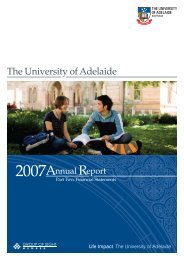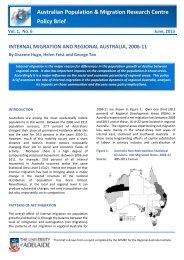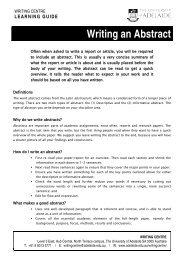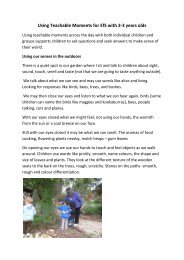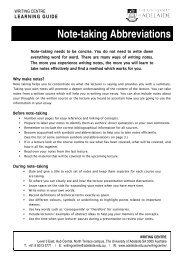Unbridling the Tongues of Women - The University of Adelaide
Unbridling the Tongues of Women - The University of Adelaide
Unbridling the Tongues of Women - The University of Adelaide
You also want an ePaper? Increase the reach of your titles
YUMPU automatically turns print PDFs into web optimized ePapers that Google loves.
<strong>The</strong> New Woman <strong>of</strong> South Australia: Grand Old Woman <strong>of</strong> Australia<br />
Now that <strong>the</strong>y were called upon to do something entirely outside <strong>the</strong>ir traditions<br />
and education, <strong>the</strong>y were ‘tormented with doubts and difficulties <strong>of</strong> a domestic, social<br />
and ethical character’. <strong>The</strong> newly-enfranchised voters <strong>of</strong> South Australia were to<br />
go to <strong>the</strong> polls for <strong>the</strong> first time in 1896. In March that year, Spence wrote an article<br />
for <strong>the</strong> Register headed ‘A Few Plain Words to <strong>the</strong> <strong>Women</strong> Electors <strong>of</strong> South Australia’<br />
in which she concentrated on <strong>the</strong> immediate need for information, indicating<br />
ways <strong>of</strong> forming preferences for candidates, and giving simple instructions about filling<br />
in voting papers. She also warned her readers against dependence on <strong>the</strong> advice<br />
<strong>of</strong> husbands, fa<strong>the</strong>rs and bro<strong>the</strong>rs, and against yielding to a candidate’s solicitations<br />
without finding out more about him. 74 It was sensible and timely advice, though it<br />
probably underestimated <strong>the</strong> political education that women had given <strong>the</strong>mselves<br />
through <strong>the</strong> suffrage campaign; <strong>the</strong> press was to observe, with patronising approval,<br />
<strong>the</strong> small number <strong>of</strong> informal votes cast. 75<br />
Economic considerations loomed large in <strong>Adelaide</strong> in an election only three<br />
years after <strong>the</strong> financial crisis sweeping Australia had become most acute in South<br />
Australia. Kingston had been brought to power amid unemployment and poverty.<br />
He was returned to power in 1896, but his majority may not have been as large as it<br />
could have been. Writing nearly half a century later, in 1944, Dorothy H. Paynter<br />
reported that:<br />
A number <strong>of</strong> women in <strong>Adelaide</strong> wished to vote, but dared not to do<br />
so. <strong>The</strong>ir husbands were employed by certain large firms whose directors<br />
were not pleased with events.<br />
It was tacitly understood that employees’ wives were expected not to vote,<br />
and it was significant that none <strong>of</strong> <strong>the</strong>m even enrolled. Some <strong>of</strong> <strong>the</strong>se<br />
women knew that <strong>the</strong>ir husbands worked too hard and that <strong>the</strong>ir wages<br />
were too low.<br />
<strong>The</strong>y knew that <strong>the</strong>ir homes were poor, and sometimes unhealthy, and<br />
<strong>the</strong>y wished to vote for <strong>the</strong> men who, <strong>the</strong>y believed, had <strong>the</strong>se matters<br />
at heart. But <strong>the</strong>y knew also that though one job was easily lost, ano<strong>the</strong>r<br />
was not easily found, and a poor home was better than none. Winter was<br />
coming on, and political independence would be small compensation if<br />
<strong>the</strong> children were cold and hungry. 76<br />
157








